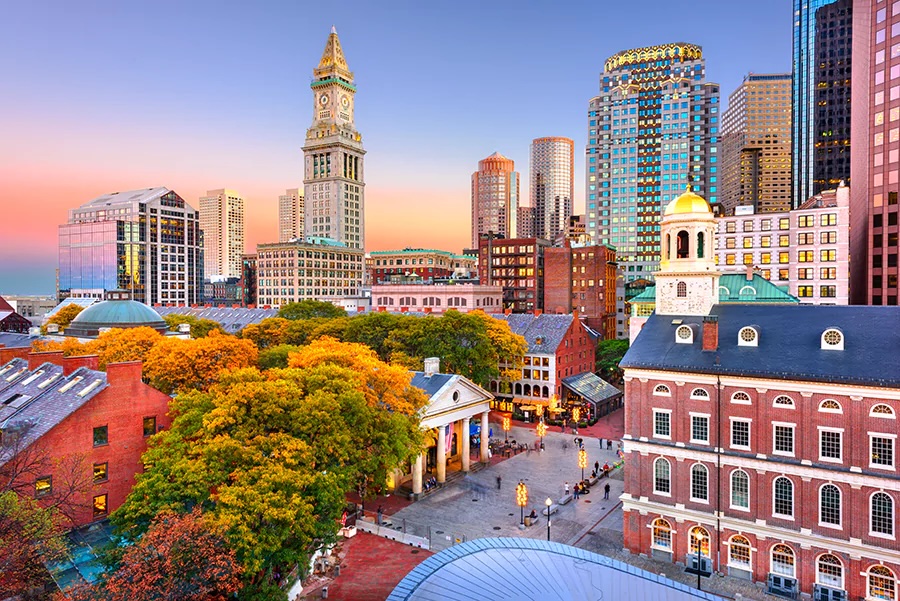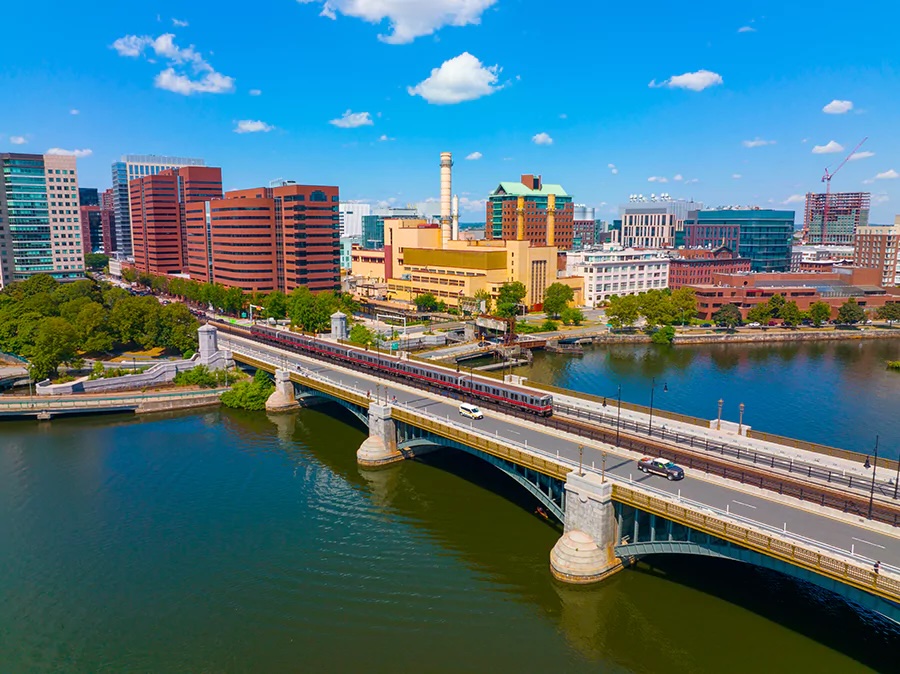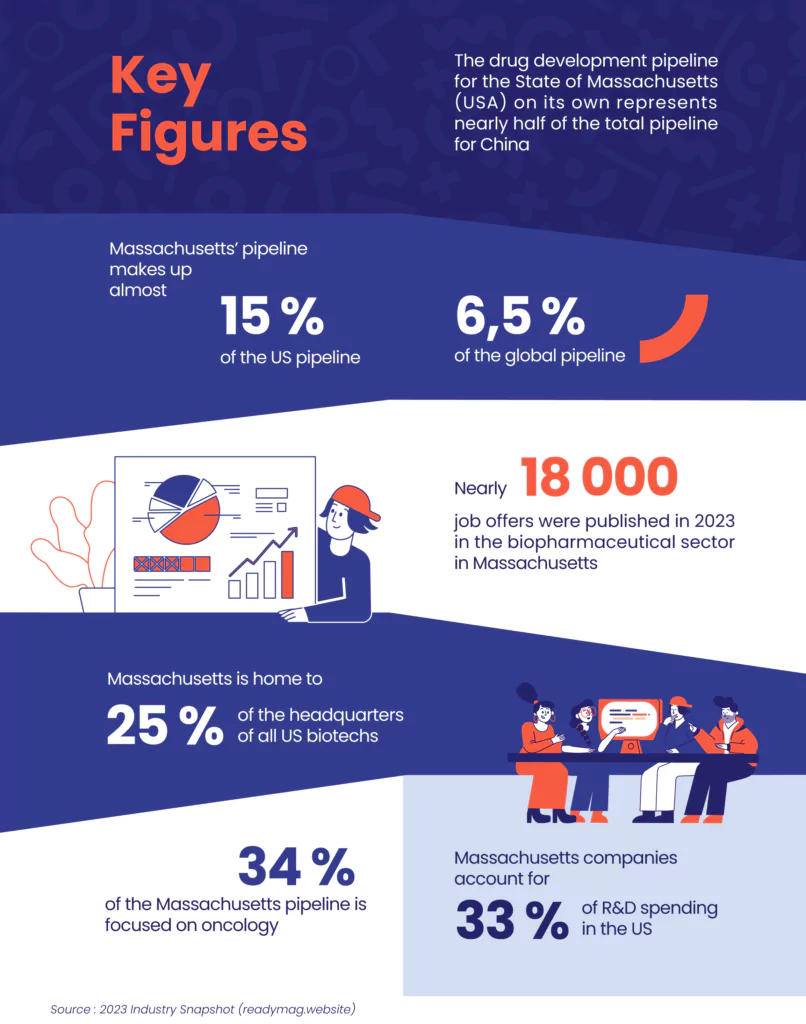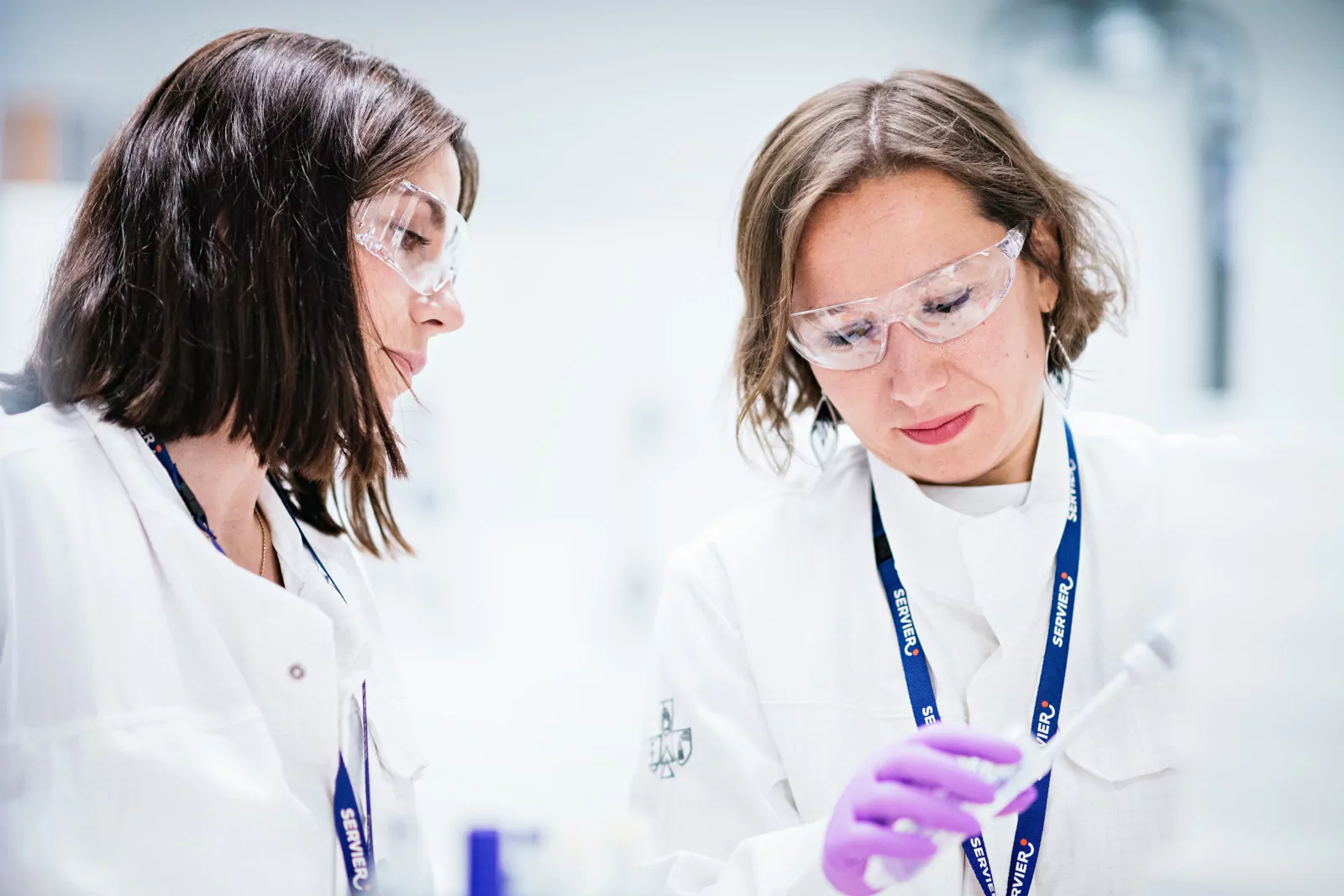
First steps: All systems go, paving the way for innovation
Kendall Square, today a world-renowned innovation hub, was nevertheless not destined to become its global capital. Its story begins in 1916, when MIT (Massachusetts Institute of Technology), the prestigious American university specialized in science and technology, wanted to expand its borders. A new building was built in an abandoned former industrial area, with one ambition: to create the leading center for scientific and technological education. This marks the stirrings of Kendall Square.
In the years that followed, MIT opened various research centers, which progressively covered all groundbreaking scientific and technological fields, from IT to aeronautics. In 1974, it inaugurated one of the world’s first cancer research centers.
1970s: A decade of contrasts for scientific innovation
In the early 1970s, researchers from MIT manage to isolate the components of DNA. This scientific revolution would pave the way to the discovery of pioneering treatments for diseases previously believed to be incurable.
However, it also raised concerns about the dangers surrounding control of human genetics. Work relating to DNA was suspended for two years at Kendall Square. This is the time that it would take the government to define a legal framework ensuring that research work is carried out for the benefit of the greater community.
Kendall Square’s golden years: Scientific revolution moves forward
Kendall Square becomes the first place — and the only place — in the world to benefit from a legal framework governing scientific research revolving around DNA. This would enable the biosciences community to flourish in this hub. This exceptional setting, coupled with the first significant results achieved by the research centers at this innovation hub attracted new companies, new biotechs and the most distinguished researchers every day. They were all looking for the best place, the right research platforms and a network of experts who share the same vision: innovating for therapeutic progress.
The arrival of private sector players also marks a new approach to research: that of the “academic entrepreneur” culture. The aim is no longer to conduct research for the sake of research, but to guide and direct the work with a view to delivering these solutions to patients. Private sector players contribute not only to funding this work, as in the example of the Whitehead Institute (a renowned institute specialized in biomedical research), but also industrializing this sector. Pharmaceutical companies are then able to open up quicker access to treatments for patients.
In the space of just a few years, the Boston-Cambridge innovation hub grew from being a handful of businesses to comprising thousands of stakeholders. This concentration of disruptive and innovative players led to the development of the first recombinant DNA research by the company Biogen in the early 1980s. It was a global scientific revolution, which would be followed by many others: human insulin, growth hormones and even the emergence of cancer treatments.
“The biotech ecosystem in Cambridge, and in Kendall Square in particular, represents an industrial density found nowhere else in the world. Strategically located between MIT and Harvard, Kendall Square is also home to leading pharmaceutical companies, a large number of biotechs, venture capital firms, industry associations, etc. It’s a flourishing ecosystem, with everything that our local startups might need for their innovations to be made available to patients. While it is not essential for biotech startups to be based in Cambridge, many high-potential companies choose to make it their home in order to benefit from easy access to the resources and potential employees located in this community.”
Biogenetics pioneers
Biogenetics was a new scientific discipline in the early 1980s. For researchers, it involved seeking to identify the causes of a disease (mutations, specific cellular mechanisms, etc.) rather than its symptoms.
When Biogen was created, the company’s founders, Walter Gilbert and Charles Weissmann, committed to relying on biotechnologies to develop therapeutic solutions for diseases with unmet needs. However, as this was a new discipline, there were few experts around the world. To achieve this goal, Biogen brought together the most renowned researchers in this field.
Their initial results were more than promising: Biogen would file a patent for the first chemical synthesis solution for the interferon alpha gene. Thanks to this innovative process, treatments for hepatitis B and certain forms of cancer, such as hairy cell leukemia or Kaposi’s sarcoma, were successfully developed.
Kendall Square today: A dream environment for biotechs
At Kendall Square, innovation is not only encouraged, but also expected. Today, this innovation hub — the only one of its kind worldwide — brings together over 1,000 companies, some of America’s leading universities (MIT, Harvard), internationally-renowned pharmaceutical companies, the five GAMAM (Google, Amazon, Meta, Apple, Microsoft), various research centers in all fields, and world-class biotech incubators (LabCentral and The Engine).
These biotechs could not hope for a better environment to support the development of their research work. Having so many renowned specialist players nearby allow them to benefit from the best counsel: the culture of sharing with peers reduces the risk of failure, capitalizing on shared experience and shared wisdom.
Biotechs are also strategically positioned to identify the needs of pharmaceutical stakeholders, especially in terms of technological platforms.
“Founded in 2013, LabCentral has been a pioneer within the life sciences startup ecosystem, introducing shared laboratory spaces and establishing new standards for industry support. LabCentral has further strengthened its presence, with over 20,000 square meters across six cutting-edge technological facilities, offering essential resources and infrastructures for 278 new innovative businesses. Part of Kendall Square, LabCentral is strategically positioned at the heart of this biotech innovation hub, facilitating technology transfers from local universities to startups. Thanks to strategic partnerships set up with pharmaceutical groups such as Servier, LabCentral offers these startups access to essential feedback as well as opportunities to develop potential collaborations, helping support scientific discoveries in the life sciences sector.
The success of LabCentral illustrates the vital impact of collaborative innovation in the life sciences sector. By clearing barriers, encouraging collaboration, and providing vital support for startups, LabCentral is continuing to stimulate scientific progress and shape the future of biotechnologies.”
What does the future hold for Kendall Square?
Artificial intelligence (AI) has opened up a wide range of new possibilities. Every day, Kendall Square players are working to develop and master these new technologies with a view to developing tomorrow’s medicine.
Every day, the health companies operating out of Kendall Square are tackling challenges in order to bring solutions to patients with unmet medical needs. The concentration of all these private and public stakeholders involved in research in one location represents an outstanding accelerator for the development of innovative therapeutic solutions. The next 30 years look promising!
“LabCentral is a dynamic environment within which we are constantly innovating to provide better support for our local businesses and our community. In addition to offering cutting-edge equipment, a community, mentoring and many other things, we are working to address an issue relating to representation at the industry level thanks to LabCentral Ignite. This innovative program aims to reduce systemic racial and sexual inequalities in the life sciences field. From pharmaceutical companies to industry leaders, STEM students and entrepreneurs driving revolutionary innovations, LabCentral Ignite is a unique platform that aims to enhance the value of the talents that have always been underrepresented in our sector. Diversity supports innovation and is essential for the future development of LabCentral and the life sciences sector.”
Rachele Ryan
Director of Partnerships, LabCentral

William Sellers and Nabeel Badeesy tell us how innovation is born in Kendall Square in an exclusive podcast.



The Servier Group has been active in the Boston-Cambridge ecosystem since 2018.
Convinced that collaborative innovation is essential to accelerating research and offering each project the best development framework, the laboratory signed nearly 70 strategic partnerships with private or public stakeholders during the 2022-2023 financial year.
And to press on in this open dynamic, since 2023, the Group has moved all its French R&D teams to the Paris-Saclay campus to bring them together in one place in France at its Institute. The Servier Research and Development Institute in Paris-Saclay represents
a major step for Servier in building a more open, dynamic and productive research environment
for the benefit of patients. It embodies and stimulates Servier’s ambition to
offer patients cutting-edge therapeutic innovations
The innovative ecosystem at the Paris-Saclay campus was not chosen at random. Like Boston-Cambridge, it is considered one of the most dynamic in the world. It currently accounts for 15% of French research (in terms of the number of researchers) and 40% of private and public research jobs in the Paris region. Eventually, it is expected to account for 25% of French research.
Biographies
Rachele Ryan
Rachele Ryan is the director of partnerships at LabCentral. She has more than a decade’s experience matching high-potential startups with contacts within Boston’s innovation ecosystem. Prior to joining LabCentral, Rachele Ryan led the MassCONNECT mentoring program at MassBio, the Massachusetts biopharma industry association. Previously, as part of the International Business Development team at the Consulate General of Canada in Boston, she assisted Canadian companies with their expansion efforts into New England and supported fast-growing startups participating in the Canadian Technology Accelerator in Boston.
William Sellers
William Sellers is a distinguished cancer scientist. He is a member of the Broad Institute of MIT and Harvard, where he leads the institute’s cancer program. He is also a faculty member at Harvard Medical School (HMS) and senior advisor to the president for experimental therapeutics at Dana-Farber Cancer Institute (DFCI).
He has been recognized with numerous awards, including the Novartis Excellence Award for Innovation, the Abbott Bioresearch Award, the Tisch Family Outstanding Investigator Award, and the National Institutes of Health Physician-Scientist Award. He is renowned among other achievements for his work with Matthew Meyerson on cancer genome sequencing, which paved the way for EGFR-inhibiting drugs becoming standard-of-care for patients.
Previously, William Sellers was also an investigator with the DFCI and associate professor of medicine at HMS. He then served as vice president and global head of oncology for the Novartis group.
Nabeel Bardeesy
Nabeel Bardeesy is associate professor of medicine at Harvard Medical School and assistant geneticist at the Massachusetts General Hospital Center for Cancer Research, and an associate member of the Broad Institute. He has more than 20 years of cancer research experience.
He holds a leadership role in a number of program initiatives in this area, including serving as co-PI (co-Principal Investigator) of the Harvard SPORE (Specialized Programs of Research Excellence )NCI /P50 (NCI – the National Cancer Institute in Gastrointestinal Cancer, Project Leader in a long-standing Program Project Grant (NCI/P01) on the Biology of Pancreatic Cancer, PI of two DOD (Department of Defense) Translational Team Science Awards for biliary cancer, and until recently, served as Director of the Scientific Advisory Board of the Cholangiocarcinoma Foundation. He has been awarded multiple NCI-R01 grants on GI cancer.
Dr. Bardeesy has an extensive track record mentoring future independent investigators. Many of his postdoctoral trainees have received major mentored fellowships and several have obtained tenure track positions in top academic institutes or have gone on to be group leaders in industry.
Our latest news
DiamPark: A game-changing digital companion for Parkinson’s patients
A Day in the Life of Biotech Startup SparingVision
World Capital for Innovation: How has the Boston-Cambridge ecosystem built its reputation?
